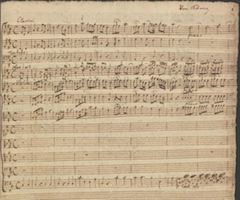An Internship in Stages: How an Internship at RISM was Possible, Despite the Corona Pandemic
Julius Rüttger
Monday, February 8, 2021

Report on an internship at the RISM Zentralredaktion in Frankfurt am Main
My internship at the RISM Editorial Center in Frankfurt am Main was marked by the 2020 corona pandemic. It all began in December 2019 with an application and interview at the RISM office in the presence of the then director, Klaus Keil, and the assistant director, Dr. Martina Falletta. On 26 February 2020, the time came for the internship to begin. First the cataloging program Muscat was explained to me, which contains all of the data. In order to get used to the program, I was given my first task, which occupied me for the next few days. Using an Excel spreadsheet, I edited records that had links in the wrong fields.
As I was developing a good sense for how Muscat worked, the situation concerning the novel coronavirus also developed, unfortunately for the worse. With a critical eye on the constantly increasing number of infections, already by the second week I was worried whether I would be able to complete the internship. The word “lockdown” was on everybody’s lips, and my work here paused.
After the 2020 summer semester, I enquired at the Editorial Center whether there was a chance of finishing my internship. I started up again in October, because at that point there were three other students who were doing internships. And thus I found myself going to Frankfurt again starting in the middle of October to be in the office two days a week. I also got to meet the new RISM director, Dr. Balázs Mikusi, who took over from Klaus Keil.
One of my more difficult tasks had to do with the incipits for the manuscript of Carl Ditters von Dittersdorf’s Hieronymus Knicker (RISM ID no. 450100638) and Johann Balthasar König’s Auf zur Lust, ihr frohen Töne (RISM ID no. 450005294). The music incipits as well as the text incipits needed to be added. The text incipits were very hard to decipher because they were written using an old German form of handwriting, Kurrentschrift. I got the hang of this with a bit of practice, and I was also able to do this from home.
All in all, I found the internship to be really quite exciting, despite corona. At first I thought that it might be hard for me to come to grips with the material, since I have a background in wind music and jazz, and do not really have much to do with classical and early music. I found the work environment to be very pleasant. I was warmly welcomed at the beginning and everyone was ready to help when there were questions. I would once again like to point out how encouraging it was that an internship was possible at all during the corona pandemic, and that it could be finished during such an unprecedented situation. I would recommend an internship at the RISM Zentralredaktion to everyone, even if you do not have a strong connection to music from 1600 to 1850 outside of coursework.
Image: Johann Balthasar König, Auf zur Lust ihr frohen Töne, RISM ID no. 450005294, D-F Ms.Ff.Mus. 1571
Share Tweet EmailCategory: New at RISM

